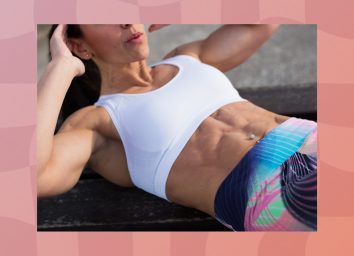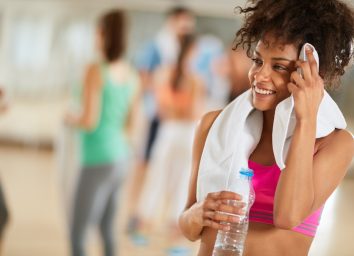Secret Tricks for Getting a Lean Body After 50, Say Experts
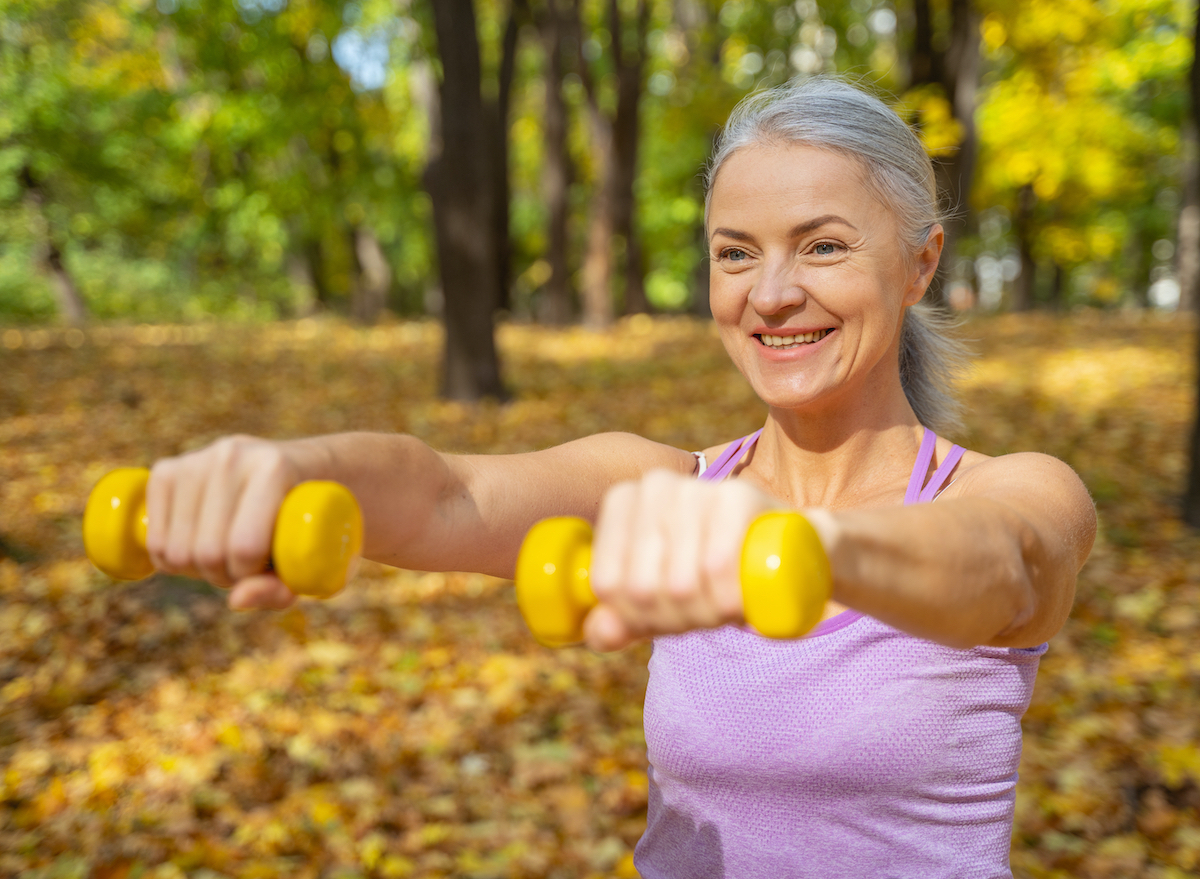
There's so much to love about getting older, but there are so many grim realities we must face, as well. Our muscle mass—essentially the amount of muscle in our bodies—peaks at age 30, and our metabolism start to sputter after 40. "By age 80, many of us have lost as much as 30 percent [of our muscle mass]," reports Melina Jampolis, MD, in her book Spice Up, Live Long. "In women, our loss of muscle mass really starts to accelerate after age 50, which is partially caused by the hormonal changes of menopause, but also by inactivity."
What's more, your muscles and tendons lose elasticity, and your joints will inevitably suffer. All of this is why, if you're looking to get a lean body after 50—which, let's be clear, you still can—you need to take a hard look at both your diet and your exercise regimen, as neither can remain the same as they were in your 20s and 30s. As it pertains to your diet, see here.
But as it pertains to your exercise, we at ETNT Mind+Body spoke to scores of experts, who revealed to us the top exercise tricks and fitness principles you need to do and apply to your life to get that lean body you always wanted. Curious to know what they are? Read on, because we've included them below. And for more exercise advice as you age, make sure you're aware of The Most Underrated Exercises Everyone Over 40 Should Do, Says Top Trainer.
Do More Strength Training, Do Less HIIT
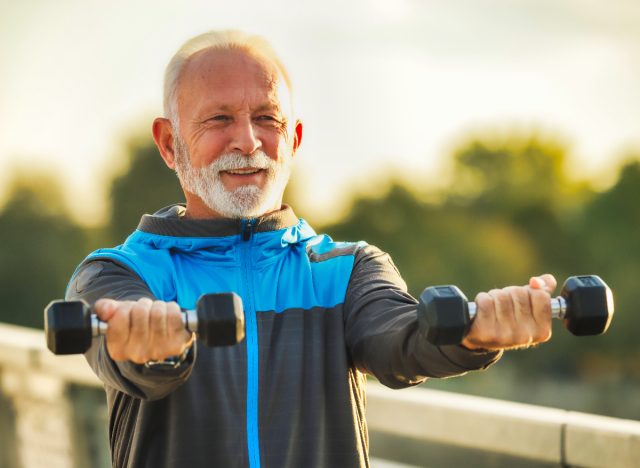
Practically every single trainer and doctor we reached out to for this article said the same thing to us: After 50, whether you're a man or a woman, the single most important thing you can do in terms of exercise is to lift more weights—period. And one thing you should seriously consider passing on is high-intensity intervals training (HIIT). (For more on HIIT, see here.)
"Around 50 is when women begin transitioning through menopause," says Traci D. Mitchell, PT, a health coach and author of The Belly Burn Plan. "Even though women can stay in fabulous shape post-50, they need to listen to their hormones. Around this age, estrogen begins to diminish greatly. In turn, fat tends to migrate north through the belly area and insulin resistance becomes a real threat. When insulin levels rise, cortisol almost always rises with it. Stress compounds stress! When stress is high, the last thing a woman should do is something like HIIT."
She, along with other experts, say that strength training is the way to go. "For both men and women it can be hugely beneficial," she says. "Not only does strength training increase muscle mass, which boosts metabolism, but it also boosts the body's natural collagen production. It's critical we have optimal collagen levels to maintain joint health. It's produced at high levels until 18. Around 25 it drops, then swan dives after 40."
According to Pam Sherman, a 54 year-old trainer and health coach, you should strength train at least three to four days per week. "You should avoid long endurance cardio or long steady-state cardio," she says. "Long cardio will make you hungry. When trying to get and stay lean, lifting weights is your best bet!"
For more on why you should lift more weights, consider the personal journey of Elizabeth Ward, MS, RDN, co-author of The Menopause Diet Plan. "In my 20s and 30s, running dominated my workout regimen, and strength training was an afterthought," she tells us. "To be honest, I was eager to control my weight and I thought that aerobic exercise was the way to go. That all changed in my 40s, when I began to realize the many benefits of lifting weights and other resistance exercise. I'm over 50 now, and I still run and take kickboxing classes, but strength training plays an equal role in my exercise routine, rather than being an afterthought." And for more great exercise advice, see here: Want to Get Lean After 40? Do These Exercises, Say Experts.
But Not Necessarily Power Lifting
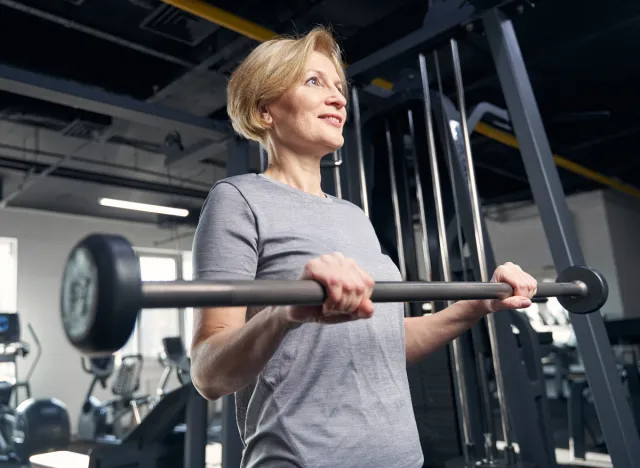
"Free weight and cable exercises are best, because they recruit more muscles than machines that lock you into one plane of movement, and free weights typically incorporate some balance training, also important as we age," says Tina Marinaccio, MS, RD, CPT.
But experts agree that you don't need to lift like your name is Schwarzenegger. "Avoid heavy weightlifting," says Amber O'Brien, RD, of Miami's the Mango Clinic. "It's not recommended for people over 50, as it increases the risk of muscle and joint injuries. Your muscles and joints are not so good to tolerate heavy weightlifting as you age."
Do More Flexibility Training, Less HIIT

In addition to strength-training, experts say you should be focusing on your flexibility, as well. "After age 50, your body loses flexibility, which makes you more prone to muscle injuries," says Allen Conrad, BS, DC, CSCS of Montgomery County Chiropractic Center in Pennyslvania. "Muscles and tendons lose elasticity, and spinal discs degenerate as we age, so it is important to incorporate forms of alternative healthcare into your regular routine, like chiropractic care, stretching and massage therapy as you hit your 50's. This will help prevent injuries, and improve the recovery time when you do get injured."
When you're not working your muscles or taking more daily walks (more on that later), he advises you to consider Pilates and yoga to keep your joints strong and your body flexible. Once again, you should avoid HIIT, according to experts. "These advances exercises can put additional stress on your joints, and people over age 50 have a greater chance of a stress fracture than younger athlete," says Conrad.
Also, he notes that hopping in the pool is a safe way to get strong. "Water exercising is an effective way to get a great workout," he says. "The water will reduce wear and tear on your body, but also provide additional resistance to keep your muscles working efficiently." For more reasons to get limber, don't miss The One Incredible Side Effect of Doing Yoga, Says New Study.
Stay Active All Day—And Walk, Walk, Walk
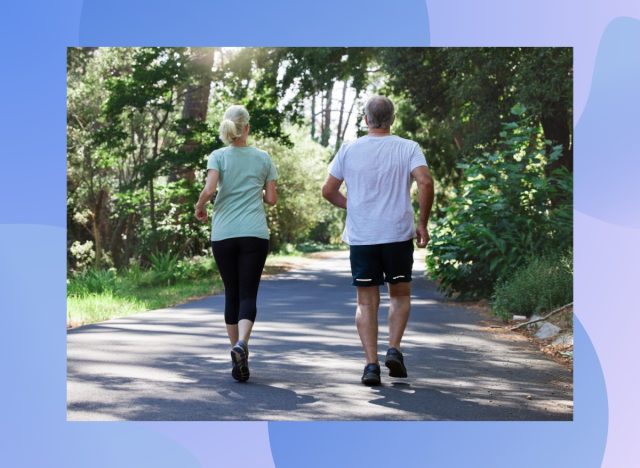
"You need to stay active during the day," says Sherman. "Make sure you get up and walk every 90 minutes or so. Add in a morning walk most days of the week. Our bodies are meant to walk, not sit all day. Everything you've read before is true: Park farther away in the parking lot, take the stairs. More daily movement is always best for our bodies." For more on the clever ways you can move more every single day, don't miss these Secret Little Tricks for Getting a Lean Body Fast, Say Experts.
Relax in Your Downtime and De-Stress
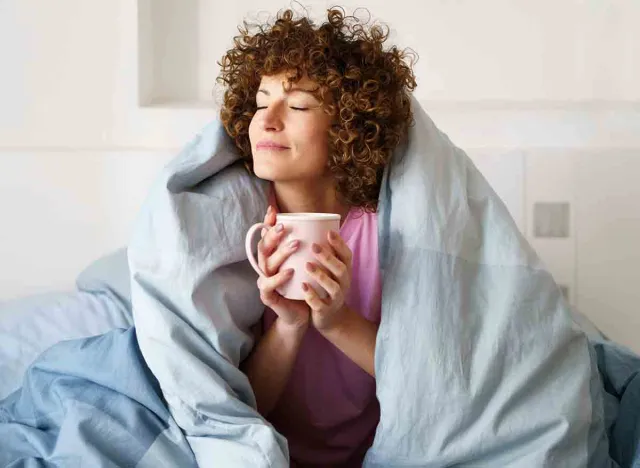
You need to reduce your stress levels, and not just for the sake of keeping your cortisol down. "Stress can affect your gut health because stress weakens the intestinal barrier and allows gut bacteria to enter your body," says Anthony S. Padula, MD. "While your body's immune system may fight it, it may lead to chronic mild symptoms when it happens constantly. Take some time out for activities or hobbies you enjoy doing, such as reading, yoga, or getting stress-relief massages."
According to Ellen Albertson, PhD, RDN, NBC-HWC, your goals should also include: "Get adequate sleep, manage stress (cortisol increases fat deposition and appetite), deal with hedonic and emotional eating, be patient (losing weight takes longer as we age), focus on lifestyle changes, make weight loss an outcome not the goal, and recognize the importance of support." And for more ways to live a smarter, healthier life at any age, don't miss the Things You Should Never Do Before Breakfast, Say Experts.

